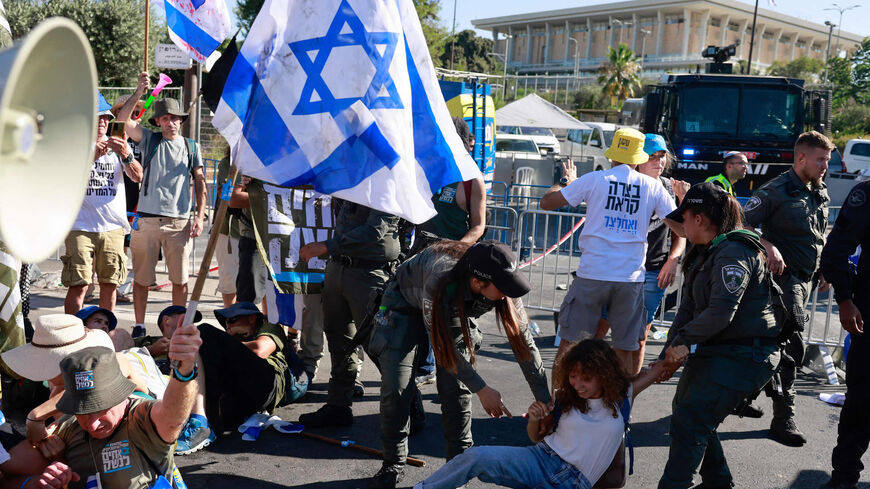Hundreds of demonstrators have been trying to block the entrance to the Knesset in Jerusalem since Monday morning, ahead of the vote over the judicial overhaul's "reasonableness clause," expected to take place at the parliament later in the day.
The clause, aimed at preventing Supreme Court oversight over government decisions, is the first element of Prime Minister Benjamin Netanyahu's judicial overhaul plan expected to be approved.
The plan seeks to limit the courts' powers and increase the government's responsibilities. Supporters of the plan claim that the courts are at the service of leftwing agendas. Its opponents, who have been demonstrating against it for several months now, believe it will destroy Israel’s democracy.
The "reasonableness clause" bill must be approved by the Knesset at a second and third reading to be enacted. According to Israeli news outlet Ynet, leaders of the opposition parties decided to boycott the third reading in a sign of protest. Several shopping malls have closed for the day, and many high-tech companies have announced they will allow their employees to take the day off if they wish to demonstrate.
Jerusalem police clashed with protestors and deployed vehicles equipped with water cannons Monday morning to disperse the demonstration. At least one of the protest movement's leaders has been reportedly detained outside the Knesset, and one demonstrator was injured in the skirmishes with the police.
A mass march departed Friday morning from kibbutz Nahshon situated at the foot of Jerusalem’s hills to the city, some 30 kilometers (19 miles) away. Ten thousand people had started walking from Nahshon to Jerusalem, with thousands of others joining them along the way. The march lasted two days, with camps set up mid-way for the night. Ynet estimated that some 80,000 people gathered at the endpoint on Saturday at Sacher Park in the center of Jerusalem, near the Knesset and the Supreme Court, where a large tent camp was erected. Many decided to stay there until after the Knesset vote on Monday.
Protesters also gathered in other locations in Israel throughout the weekend, such as in Beersheba and at Karkur junction, in central Israel. At the same time, thousands of judicial overhaul supporters gathered in the center of Tel Aviv on Sunday night.
Over 1,000 Israeli and Jewish American demonstrators marched on Sunday over the Brooklyn Bridge in New York City, demonstrating against the government’s judicial overhaul.
President Isaac Herzog continued over the weekend his efforts for the sides to reach a compromise on the "reasonableness clause," in an attempt to postpone the vote on the bill for several months, but he has been unsuccessful so far. Herzog met with Netanyahu on Sunday at Tel HaShomer hospital, after the premier underwent an operation to place a pacemaker, a cardiac medical device. Herzog also met with opposition leader Yair Lapid on Sunday. Netanyahu was released from the hospital Monday morning, and is expected to arrive at the Knesset later in the day for the debate and the vote on the bill.
Axios and Walla News journalist Barak Ravid published on Sunday a second warning from US President Joe Biden asking to suspend the vote over the judicial overhaul plan. In a statement to Axios, Biden called upon Netanyahu not to move forward with the planned Knesset vote, saying he is highly concerned about the legislation and its potential implications. “Given the range of threats and challenges confronting Israel right now, it doesn’t make sense for Israeli leaders to rush this — the focus should be on pulling people together and finding consensus," Ravid quoted Biden's statement as saying.
An unnamed spokesperson for the US Embassy in Jerusalem told The Times of Israel Monday morning it was following closely all recent developments. “We understand intensive discussions continue this morning to try and reach a compromise. We remain hopeful that an acceptable arrangement can be reached,” the source said.







